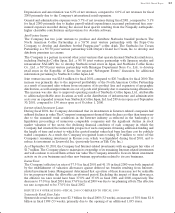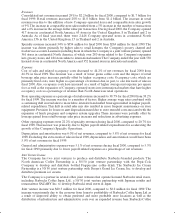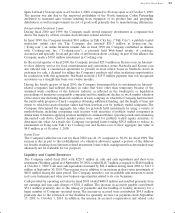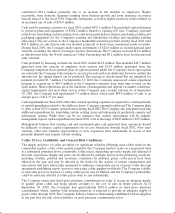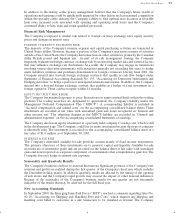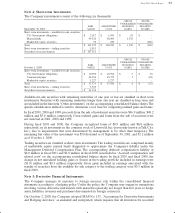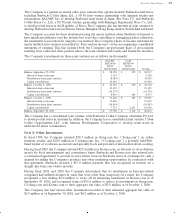Starbucks 2001 Annual Report Download - page 17
Download and view the complete annual report
Please find page 17 of the 2001 Starbucks annual report below. You can navigate through the pages in the report by either clicking on the pages listed below, or by using the keyword search tool below to find specific information within the annual report.
Fiscal 2001 Annual Report 33
Notes to Consolidated Financial Statements
Years ended September 30, 2001, October 1, 2000, and October 3, 1999
Note 1: Summary of Significant Accounting Policies
DESCRIPTION OF BUSINESS
Starbucks Corporation (together with its subsidiaries,“Starbucks” or the “Company”) purchases and
roasts high-quality whole bean coffees and sells them, along with fresh, rich-brewed coffees, Italian-
style espresso beverages, cold blended beverages, a variety of pastries and confections, coffee-related
accessories and equipment, a selection of premium teas and a line of compact discs primarily through
its Company-operated retail stores. In addition to sales through its Company-operated retail stores,
Starbucks sells coffee and tea products through other channels of distribution including the Business
Alliances business unit and other specialty operations (collectively,“Specialty Operations”). Starbucks,
through its joint venture partnerships, also produces and sells bottled Frappuccino®coffee drink and
a line of premium ice creams.The Company’s objective is to establish Starbucks as the most recognized
and respected brand in the world.To achieve this goal, the Company plans to continue to rapidly
expand its retail operations, grow its Specialty Operations and selectively pursue other opportunities
to leverage the Starbucks brand through the introduction of new products and the development of
new distribution channels.
PRINCIPLES OF CONSOLIDATION
The consolidated financial statements reflect the financial position and operating results of Starbucks,
its subsidiaries and investments in joint ventures in which the Company has significant control. All
significant intercompany transactions have been eliminated.
The Company has investments in unconsolidated joint ventures that are accounted for under the
equity method, as the Company does not exercise control over the operating and financial policies of
such joint ventures.The Company also has other investments that are accounted for under the cost
method.
FISCAL YEAR-END
The Company’s fiscal year ends on the Sunday closest to September 30. The fiscal years ended
September 30, 2001, and October 1, 2000, each included 52 weeks.The fiscal year ended October 3,
1999, included 53 weeks.
ESTIMATES AND ASSUMPTIONS
The preparation of financial statements in conformity with accounting principles generally accepted
in the United States of America requires management to make estimates and assumptions that affect
the reported amounts of assets, liabilities, revenues and expenses.Actual results may differ from these
estimates.
CASH AND CASH EQUIVALENTS
The Company considers all highly liquid instruments with a maturity of three months or less at the
time of purchase to be cash equivalents.
CASH MANAGEMENT
The Company’s cash management system provides for the reimbursement of all major bank
disbursement accounts on a daily basis. Checks issued but not presented for payment to the bank are
reflected as “Checks drawn in excess of bank balances” on the accompanying consolidated financial
statements.
SHORT-TERM INVESTMENTS
The Company’s investments consist primarily of investment-grade marketable debt and equity
securities as well as bond and equity mutual funds, all of which are classified as trading or available-
for-sale.Trading securities are recorded at fair value with unrealized holding gains and losses included
in earnings. Available-for-sale securities are recorded at fair value, and unrealized holding gains and
losses are recorded, net of tax, as a separate component of accumulated other comprehensive income.
Unrealized losses are charged against net earnings when a decline in fair value is determined to be
other than temporary. Realized gains and losses are accounted for on the specific identification
method. Purchases and sales are recorded on a trade date basis.


